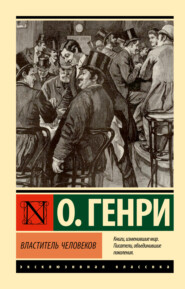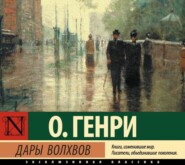По всем вопросам обращайтесь на: info@litportal.ru
(©) 2003-2025.
✖
Sixes and Sevens
Настройки чтения
Размер шрифта
Высота строк
Поля
"Der balance," said the customer, "is not in good drawing. Der bairspective of it is not true. Goot morning, madame."
He took his bread, bowed, and hurried out.
Yes, he must be an artist. Miss Martha took the picture back to her room.
How gentle and kindly his eyes shone behind his spectacles! What a broad brow he had! To be able to judge perspective at a glance – and to live on stale bread! But genius often has to struggle before it is recognized.
What a thing it would be for art and perspective if genius were backed by two thousand dollars in bank, a bakery, and a sympathetic heart to – But these were day-dreams, Miss Martha.
Often now when he came he would chat for a while across the showcase. He seemed to crave Miss Martha's cheerful words.
He kept on buying stale bread. Never a cake, never a pie, never one of her delicious Sally Lunns.
She thought he began to look thinner and discouraged. Her heart ached to add something good to eat to his meagre purchase, but her courage failed at the act. She did not dare affront him. She knew the pride of artists.
Miss Martha took to wearing her blue-dotted silk waist behind the counter. In the back room she cooked a mysterious compound of quince seeds and borax. Ever so many people use it for the complexion.
One day the customer came in as usual, laid his nickel on the showcase, and called for his stale loaves. While Miss Martha was reaching for them there was a great tooting and clanging, and a fire-engine came lumbering past.
The customer hurried to the door to look, as any one will. Suddenly inspired, Miss Martha seized the opportunity.
On the bottom shelf behind the counter was a pound of fresh butter that the dairyman had left ten minutes before. With a bread knife Miss Martha made a deep slash in each of the stale loaves, inserted a generous quantity of butter, and pressed the loaves tight again.
When the customer turned once more she was tying the paper around them.
When he had gone, after an unusually pleasant little chat, Miss Martha smiled to herself, but not without a slight fluttering of the heart.
Had she been too bold? Would he take offense? But surely not. There was no language of edibles. Butter was no emblem of unmaidenly forwardness.
For a long time that day her mind dwelt on the subject. She imagined the scene when he should discover her little deception.
He would lay down his brushes and palette. There would stand his easel with the picture he was painting in which the perspective was beyond criticism.
He would prepare for his luncheon of dry bread and water. He would slice into a loaf – ah!
Miss Martha blushed. Would he think of the hand that placed it there as he ate? Would he —
The front door bell jangled viciously. Somebody was coming in, making a great deal of noise.
Miss Martha hurried to the front. Two men were there. One was a young man smoking a pipe – a man she had never seen before. The other was her artist.
His face was very red, his hat was on the back of his head, his hair was wildly rumpled. He clinched his two fists and shook them ferociously at Miss Martha. At Miss Martha.
"Dummkopf!" he shouted with extreme loudness; and then "Tausendonfer!" or something like it in German.
The young man tried to draw him away.
"I vill not go," he said angrily, "else I shall told her."
He made a bass drum of Miss Martha's counter.
"You haf shpoilt me," he cried, his blue eyes blazing behind his spectacles. "I vill tell you. You vas von meddingsome old cat!"
Miss Martha leaned weakly against the shelves and laid one hand on her blue-dotted silk waist. The young man took the other by the collar.
"Come on," he said, "you've said enough." He dragged the angry one out at the door to the sidewalk, and then came back.
"Guess you ought to be told, ma'am," he said, "what the row is about. That's Blumberger. He's an architectural draftsman. I work in the same office with him.
"He's been working hard for three months drawing a plan for a new city hall. It was a prize competition. He finished inking the lines yesterday. You know, a draftsman always makes his drawing in pencil first. When it's done he rubs out the pencil lines with handfuls of stale bread crumbs. That's better than India rubber.
"Blumberger's been buying the bread here. Well, to-day – well, you know, ma'am, that butter isn't – well, Blumberger's plan isn't good for anything now except to cut up into railroad sandwiches."
Miss Martha went into the back room. She took off the blue-dotted silk waist and put on the old brown serge she used to wear. Then she poured the quince seed and borax mixture out of the window into the ash can.
IV
THE PRIDE OF THE CITIES
Said Mr. Kipling, "The cities are full of pride, challenging each to each." Even so.
New York was empty. Two hundred thousand of its people were away for the summer. Three million eight hundred thousand remained as caretakers and to pay the bills of the absentees. But the two hundred thousand are an expensive lot.
The New Yorker sat at a roof-garden table, ingesting solace through a straw. His panama lay upon a chair. The July audience was scattered among vacant seats as widely as outfielders when the champion batter steps to the plate. Vaudeville happened at intervals. The breeze was cool from the bay; around and above – everywhere except on the stage – were stars. Glimpses were to be had of waiters, always disappearing, like startled chamois. Prudent visitors who had ordered refreshments by 'phone in the morning were now being served. The New Yorker was aware of certain drawbacks to his comfort, but content beamed softly from his rimless eyeglasses. His family was out of town. The drinks were warm; the ballet was suffering from lack of both tune and talcum – but his family would not return until September.
Then up into the garden stumbled the man from Topaz City, Nevada. The gloom of the solitary sightseer enwrapped him. Bereft of joy through loneliness, he stalked with a widower's face through the halls of pleasure. Thirst for human companionship possessed him as he panted in the metropolitan draught. Straight to the New Yorker's table he steered.
The New Yorker, disarmed and made reckless by the lawless atmosphere of a roof garden, decided upon utter abandonment of his life's traditions. He resolved to shatter with one rash, dare-devil, impulsive, hair-brained act the conventions that had hitherto been woven into his existence. Carrying out this radical and precipitous inspiration he nodded slightly to the stranger as he drew nearer the table.
The next moment found the man from Topaz City in the list of the New Yorker's closest friends. He took a chair at the table, he gathered two others for his feet, he tossed his broad-brimmed hat upon a fourth, and told his life's history to his new-found pard.
The New Yorker warmed a little, as an apartment-house furnace warms when the strawberry season begins. A waiter who came within hail in an unguarded moment was captured and paroled on an errand to the Doctor Wiley experimental station. The ballet was now in the midst of a musical vagary, and danced upon the stage programmed as Bolivian peasants, clothed in some portions of its anatomy as Norwegian fisher maidens, in others as ladies-in-waiting of Marie Antoinette, historically denuded in other portions so as to represent sea nymphs, and presenting the tout ensemble of a social club of Central Park West housemaids at a fish fry.
"Been in the city long?" inquired the New Yorker, getting ready the exact tip against the waiter's coming with large change from the bill.
"Me?" said the man from Topaz City. "Four days. Never in Topaz City, was you?"
"I!" said the New Yorker. "I was never farther west than Eighth Avenue. I had a brother who died on Ninth, but I met the cortege at Eighth. There was a bunch of violets on the hearse, and the undertaker mentioned the incident to avoid mistake. I cannot say that I am familiar with the West."
"Topaz City," said the man who occupied four chairs, "is one of the finest towns in the world."
"I presume that you have seen the sights of the metropolis," said the New Yorker, "Four days is not a sufficient length of time in which to view even our most salient points of interest, but one can possibly form a general impression. Our architectural supremacy is what generally strikes visitors to our city most forcibly. Of course you have seen our Flatiron Building. It is considered – "
"Saw it," said the man from Topaz City. "But you ought to come out our way. It's mountainous, you know, and the ladies all wear short skirts for climbing and – "
"Excuse me," said the New Yorker, "but that isn't exactly the point. New York must be a wonderful revelation to a visitor from the West. Now, as to our hotels – "
"Say," said the man from Topaz City, "that reminds me – there were sixteen stage robbers shot last year within twenty miles of – "

















